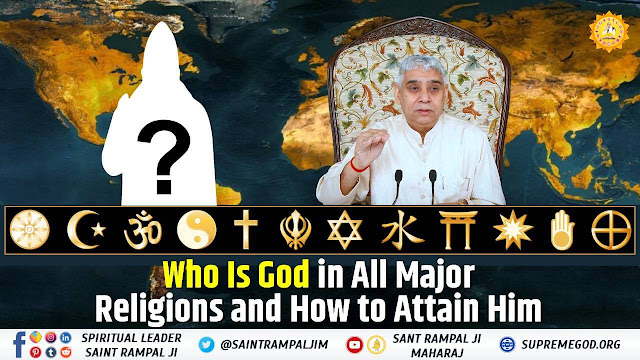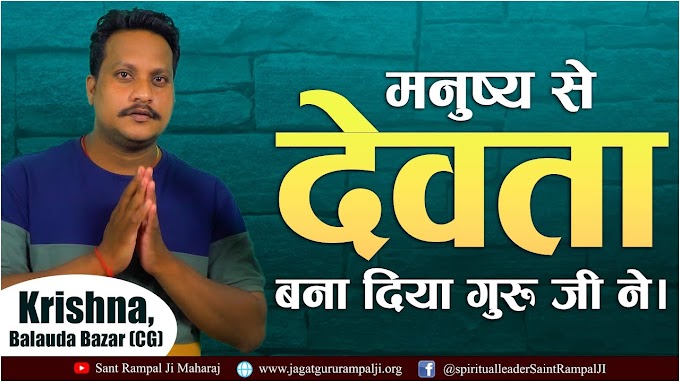People are always curious to get the authentic and true information on: Who is God? What is God? What does He look Like? and How to Attain Him? Today we are going to solve this mystery with the help of our holy scriptures. We will cover these points in this blog post:
■ Who is God in Hinduism (Hindu Religion)
■ Who is God in Islamic Religion
■ Who is God in Sikhism
■ Who is God in Jainism
■ Who is God in Buddhism
■ Who is God in Christianity (Bible)
Let's start with the discussion on God in Hinduism:
Concept of God in Hinduism
There are 33 crore deities in Hindu Religion (or Hinduism), but devotees are always confused about who is the most powerful God in them? Who is the Supreme God in Hindu religion? and What is the Concept of God in Hinduism? There are so many saints and Gurus in Hindu Religion who explained the concept of God in Hinduism that God is formless and the Hindu Trinity, i.e. Brahma, Vishnu and Shiva, are the Supreme Powers but Jagat Guru Sant Rampal Ji Maharaj is different from them. Because He said in His Spiritual Discourses that the Supreme God is other than the Trinity (Brahma, Vishnu, and Mahesh). Read in detail about the Concept of God in Hinduism.
Concept of God in Islamic Religion (Islam)
Islam is the world’s second largest religion. People and scholars of Islamic religion believe that Allah is formless, i.e., body-less. But Jagatguru Saint Rampal Ji Maharaj has explained in His Spiritual Discourses that Allah is not formless rather is in human-like Body form. And, the name of the Almighty Allah is “Kabir”. It is clearly mentioned in the Holy Quran Sharif Surat Furqani 25 Ayat 52-59. Read complete information on the Concept of God in Islam (Islamic Religion)
Concept of God in Sikh Religion (Sikhism)
According to the Sikh Scholars and Sikh religious teachers, the concept of God in Sikhism (or Sikh Religion) is fairly believed that God is Nirankar means God is formless, i.e., God has no body. Jagatguru Saint Rampal Ji Maharaj has explained here as well in His Satsangs that the concept of God in Sikhism or Sikh Religion is opposite to it, that is, God is not formless or bodiless means God looks like humans with the proof in Holy Guru Granth Sahib Ji. Read in detail about the Concept of God in Sikhism.
Concept of God in Christianity (Bible)
The concept of God in Chrisatinity or in the Bible is believed to be that God is Almighty but is formless. Most of the Christains believe that Jesus Christ was God but some other believers believe that he was not God but the son of God. Jagatguru Saint Rampal Ji Maharaj has told the reality of Chritainity with proof from the Holy Bible. Read complete information about God in Chritainity (Bible).
Concept of God in Jainism (Jain Religion)
The followers of Jainism believe that Rishabh Dev was the founder of Jainism.
There is evidence in Kabir Sagar Chapter 31 ‘Jain Dharam Bodh’ on page no. 45 (1389) that proves itself that Almighty Kavir Dev met Rishabh Dev Ji in Satyug according to His Law of meeting virtuous souls to impart true spiritual knowledge to them. The Sage Kabir, introducing Himself as Kabi, inspired Rishabh Dev Ji to do worship and attain emancipation. Read in detail about the Concept of God & Tirthankar's in Jainism (Jain Religion).
Concept of God in Buddhism (Buddha Religion)
There are various beliefs about the path of emancipation in Buddhism. This religion is the fourth largest religion in the world. That's why it connects many traditions and practices based on the teachings of Lord Buddha. Let's go through the concept of God in Buddhism with this article by getting an overview on the biography of Gautam Buddha and also try to analyse whether the religious practices followed in Buddhism are appropriate in the attainment of emancipation or not. Read more about the Concept of God in Buddhism (Buddha Religion)
Who Is the Param Aksham Brahm/God in Rig Veda and in Bhagavad Gita?
Rigveda Mandal 1 Sukt 1 Mantra 1-10 proves that God is referred to as ‘Agni’. The creator of the entire universes, the Lord of the lineage, is God Kabir whose body is highly radiant. One hair follicle of God Kabir has more brightness than the combined light of millions of suns and moons in His Satloka. He has created infinite universes with His word power.
who is god? #AskAnupam
— SA News Channel (@SatlokChannel) May 15, 2019
to know more
🔽🔽 https://t.co/yOTqiOFbaL
Rigveda Mandal 1 Sukt 31 Mantra 17 proves that ‘Manushyavat’, i.e., God is like humans. You (God) had been descending here even earlier. Kindly give Your audience again and tell us true spiritual knowledge.
■ Also Read: Who is God in All Religion with Evidence
Rigveda Mandal 1 Sukt 144 Mantra 11 proves that ‘Nirmit Dev’ God is like humans.
Rigveda Mandal 1 Sukt 46 Mantra 3 proves that God is in human form, ‘Manushyavat Shambhu’.
Rigveda Mandal 8 Sukt 18 Mantra 21 proves that God is ‘Narvat Varun’, like humans.
Rigveda Mandal 9 Sukt 94 Mantra 1 proves that God Kabir (Kaviyam vrajam na) provides Tatvagyan through poems, proverbs, couplets that's why people consider Him a poet whenever He descends here.
Let's come to the evidence of Supreme God in Holy Bhagavad Gita:-
Gita Chapter 7 Verse 29:- Brahm Kaal says that 'knowing that Tat-Brahm and becoming familiar with the entire spirituality and all deeds, a person only makes efforts to get relieved from old-age and death’. It's indicating towards Param Akshar Brahm.
In Gita Chapter 8 Verse 1, Arjun asks Brahm― in Chapter 7 Verse 29, you have provided information of that ‘Tat-Brahm’, knowing Whom the creatures only make efforts to get relieved from old-age and death, 'who's that Tat-Brahm?'
Gita Chapter 8 Verse 3:- Brahm replies that ‘He is Param Akshar Brahm’, who always lives with the soul.
Chapter 8 Verse 8:- Brahm says ‘Oh Parth! This is the rule. One who chants those three mantras and does not deviate and continues worshipping to attain god. That man ‘param divyampurusaHyati’ attains that Param Akshar Brahm.
Chapter 8 Verse 9:- The name of God is mentioned as ‘God Kavirdev' i.e. Supreme God Kabir who is everlasting, omnipresent, omnipotent, means Lord of the Lords, subtlest of the subtle, sustainer of all, in unimaginable form, highly radiant form like sun, means illuminating body like the sun, is in form, is far from ignorance. Do worship that Sacchidanandghan Brahm, means worship that Param Akshar Brahm and attain emancipation.
Can Science Prove the Existence of God?
Many people make an argument that the natural world and humanity’s existence in the Universe indicate towards a Divine Creator that brought forth all of this into existence. Many scholars and scientists over the centuries have made many attempts to prove the existence of God. The basis of their evidence was limited to the description of the earth and the universe, and not to interpret who God is.
Scientists believe that God/Supreme Being is only an imaginary entity and does not exist in reality. They claim that the existence of an omniscient God, who is considered the creator of infinite universes, is ornate and only imaginary. They argued that every physical object is possessed of a finite amount of energy, which includes all the planets, stars etc. But the fact is that there must be some infinite power (God) to carry forward the motion of all these finite objects. Some scientists in the solar system argue that the existence of God is incompatible with science. Science does not believe that infinite power (God) is in shape (form). However, scientists fail to find out how the universe could exist, (with or without 'God'?)
On the other hand, the rational argument of some scientists suggests that there is certainly some higher being whose perfection is reflected in Their creation, that the Supreme is God.
Note: Where science ends, the existence of God begins from there. For the same, evidence is provided in this article, which proves that God is in human form. He resides in the supreme abode.







0 Comments